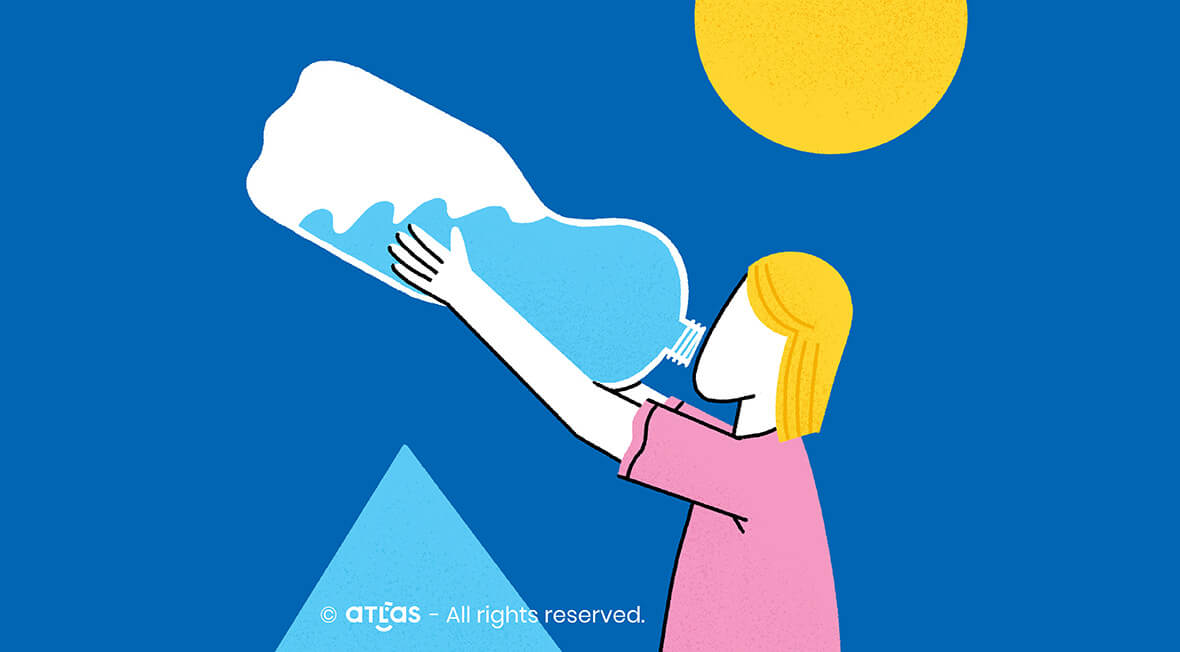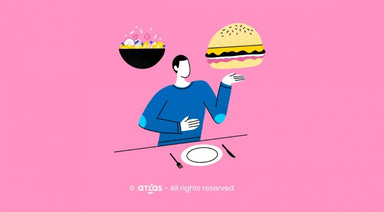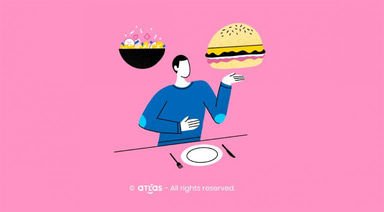How much water do we have to drink, really? Two liters? No matter what age? Weight? Height? Can we drink them in the morning, take a look off our heads? Water from melon or cucumbers is put? We have a lot of questions about proper hydration that you also probably have, so we talked to ATLAS Specialists to make it all clear for us.
There was a picture online about the fact we were just cucumbers with emotions :). So, what do we have in common with them? What about the grass in the yard and the parrot in the cage? Exactly! Hydration!
At the advice clock with my grandparents, we all heard from time to time “look who has to bring me a cup of water in old age,” and on the days of burning, when the real heat had not yet “invented,” it was said: “Give us, Lord, rain!”. Have you ever heard an older man wise-timed say who’s going to make me a bloody steak in old age? No, obviously. Sometimes we put the remnant that true nutrition with all the proper hydration, was invented by our elders, you know, on a natural feeling in harmony with nature, which we have kind of lost.
We wait for commercial ads to tell us how much water to drink, how to wash, and how much to eat. You listen to your body if he doesn’t listen to you anymore. In the meantime, hydrate!
There’s nothing wrong with creating a good relationship with water in the city; take it with you in any form and if you prefer it with lemon, do that too. Beyond the old jokes, it will save you many physical problems, but it also seems cognitive.
You’ve probably heard the advice of “drink eight glasses of water a day!”. That’s easy as a memory pattern, and it’s a reasonable goal. For others, less than eight glasses a day might be enough; some might need more. Water is more than half of body weight, and a person can’t survive more than a few days without it? Let’s see, let’s see.
Your cells shout “water!” to work
Your blood, containing a lot of water, carries oxygen into all your body cells. Without oxygen, those small cells would die, and your body would neither function.
It is quite obvious that having an adequate amount of water in the body is critical for almost every part of it. Not only does the recommended daily intake help you maintain your current good health, but it could also improve in the long run.
Why is hydration important? Because water helps in all metabolic processes:
-
Water helps by creating saliva
Water is the main component of saliva, helping to break down solid foods and preserve the health of the mouth. Dry mouth is the first sign that you need to increase the amount of water you drink.
-
Adjusts body temperature
Maintaining hydration is essential for maintaining normal body temperature. Our bodies lose water when we sweat but also in hot environments. Sweat keeps our bodies cold, but our body temperature will rise if we don’t restore the water we lose. This lack of water causes dehydration, which in turn causes the level of electrolytes and plasma to decrease.
-
Water is “support” for cognitive functions
Proper hydration is crucial to staying in good cognitive shape. Research has shown that inadequate water intake can have a negative impact on short-term focus, alertness, and memory.
-
Water protects tissues, spinal cord, and joints
Water helps lubricate joints, spinal cord, and tissues. This helps us to be more physically active and reduces discomfort caused by conditions such as arthritis.
-
Helps remove toxins from our bodies through sweating, urination, and defecation
We all need water to replenish fluids lost through sweating. We also need water to have healthy stools and avoid constipation. Drinking enough water helps the kidneys to work more efficiently, thus preventing kidney stones.
-
Water increases physical performance
Drinking water when we exercise or just a little movement is essential. Hydration positively affects tresistance.
-
Helps increase our energy levels
Drinking water helps increase our metabolic rate. This impulse has a positive impact on our energy levels.
Studies give as certainty: the consumption of 500 millilitres of water can boost metabolic rate by 30 percent – in
both men and women.
-
Water prevents general dehydration
Dehydration is the result of the fact that the body is deprived of adequate water. And because water is critical for the successful functioning of many bodily functions, dehydration can be very dangerous, leading to fatal consequences.
Severe dehydration can lead to swelling of the brain, renal failure, Seizures.
Be sure to drink enough water to replace what is lost through sweating, urination, and bowel movements to avoid dehydration.
Mary L. Gavin, MD:
All living beings must have access to water to survive, whether they take it from a water fountain, a rain cloud, or a small bottle attached to the side of a hamster cage.
Controversy about “at least two liters”!
Does your mountain house also have a fountain with super-qualitative water? What about hydration if you sit in the Caribbean on the beach and drive a small store in full sun? What if you work in a 19-degree corporation shown by the AC machine? Are you under normal weight or, on the contrary, suffer from obesity? The amount of water you need will depend on the environment and climate in which you live, how physically active you are, and whether you suffer from a health problem.
So how much liquid do an average and healthy adult need living in a temperate climate?? The WHO has determined that an adequate daily intake of liquids is: a minimum of 25 millilitres of liquids per kilogram by weight.
Studies also talk about:
- Approximately 15.5 cups of liquids for men
- Approximately 11.5 cups of liquids per day for women
What else is helping you? About 20 percent of your daily fluid intake, which usually comes from food and the rest from hydrated drinks.
Acute dehydration – a medical problem
Dehydration is the adverse consequence of inadequate water intake. Also, the symptoms of acute dehydration vary depending on the degree of water deficiency, according to WHO, BIST, AMA.
If we refer to body weight:
- loss of 1% of body weight affects thermoregulation; thirst occurs at this level of dehydration;
- thirst increases to 2%, with dry mouth that occurs at a loss of about 3%; discomfort and loss of appetite also occurs at 2%;
- thermoregulation at exertion is affected at 1% dehydration;
- at 4% we reach the impairment of working capacity;
- concentration, headaches, and drowsiness are observed at 5%;
- tingling and numbness of the extremities can be observed at 6%, and collapse can occur at about 7% dehydration.
You need a specialist when…
You need a specialist if you are one of those who can not touch the water at all or do not know how many liquids you should consume daily, you have some health problems incompatible with the general advice for good hydration, and you need support.
Let’s meet for a drink… let’s have some water!


